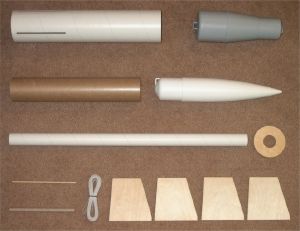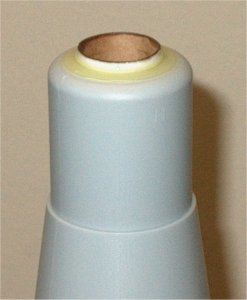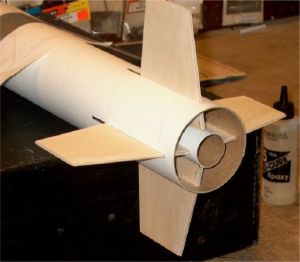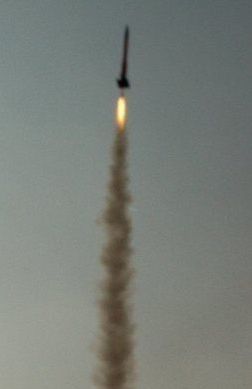| Construction Rating: | starstarstarstar_borderstar_border |
| Flight Rating: | starstarstarstarstar |
| Overall Rating: | starstarstarstarstar_border |
| Manufacturer: | LOC/Precision  |
 Brief:
Brief:
The LOC Norad is a kit which has the looks and feel of a military missile and
is one of the medium range kits from the LOC line of models. It sports a three
inch body that transitions to two inches, uses a four fin configuration and
stands over three feet tall.
Modifications:
Fiberglassed Fins, Reinforced Shockcord Mount.

Construction:
In the bag you will find a three inch lower body tube pre-slotted for fins, a
3" to 2" plastic transition, a two inch body tube, plastic nosecone,
long 29mm motor mount tube, a single centering ring, ¼" elastic shock
cord, 24 inch nylon parachute, heavy paper ¼" launch lug and a single
page of instructions. All components are of typical LOC quality, from the
1/8" aircraft ply used for fins through the heavy paper body tubes. I was
disappointed only in the shock cord and it's side wall mounting; everything
else was perfect.

Fifteen-minute epoxy was used throughout the construction, which begins with the assembly of the motor mount. A single, very long paper motor mount comes with the kit and the first step is to cut the center out of the plastic transition coupler. It is marked for 29mm and I used an Exacto knife to cut holes on both sides of the transition. The body tube is slipped through the transition coupler and epoxied on the top side. They also want you to glue the single centering ring on the bottom. I wish they would have provided two CR's so the fins could be wedged between them, but the single ring on one end and support of the upper tube by running it through the transition shoulder works fine. I installed the tube in the transition and did not install the lower centering ring until the fins were epoxied and inside fillets were added.
Once the mount is installed, you glue each fin to the motor mount. For a smaller kit, it came equipped with through-the-wall fin mounting, a nice touch on LOC's part. I tapered the leading edge of each fin prior to installation and followed the instructions to the letter. For a single sheet of instructions, it takes you easily through each step, which certainly made building easier. After the fins were installed, I glassed the inside fin area to the body tube and motor mount for added strength, then fillets were added to the inside of these joints. Once completed, the bottom centering ring was epoxied in place.
 The upper body tube is glued over the transition
shoulder next and, since I decided to glass the entire rocket, I removed the
very top layer of glassine from the upper tube so it would easily soak up the
glassing resin. The entire model was fiberglassed using 2 oz cloth and epoxy
finishing resin, extra cloth was sanded off and fillets were added to each fin.
One of the final steps was to mount the six inch long ¼" heavy paper
lug and I added fillets to the lug once it was set in place. The added strength
from fiberglassing would bring the weight of the model to about the same as a
PML kit and allow me to launch it safely on a high power load.
The upper body tube is glued over the transition
shoulder next and, since I decided to glass the entire rocket, I removed the
very top layer of glassine from the upper tube so it would easily soak up the
glassing resin. The entire model was fiberglassed using 2 oz cloth and epoxy
finishing resin, extra cloth was sanded off and fillets were added to each fin.
One of the final steps was to mount the six inch long ¼" heavy paper
lug and I added fillets to the lug once it was set in place. The added strength
from fiberglassing would bring the weight of the model to about the same as a
PML kit and allow me to launch it safely on a high power load.
Construction Rating: 4 of 5
Finishing:
Sanding was done in the filet area using 100 grit paper, then finished with 150
grit sandpaper. White Krylon primer was applied next and I used 150 grit to cut
away any excess epoxy resin left from the fiberglassing and to blend in the
cloth seams. Use an electric sander in the glassed area, which will cut through
the epoxy nicely and blend glass seams well. A few more coats of primer were
added, then I wet sanded with 220 grit. Two more coats of primer were added and
I finished it up by wet sanding with 400 grit. Any small filling was done next,
then two final coats of primer were added and wet sanded with 600 grit wet/dry
sandpaper.
This rocket was a gift to my daughter, so it was her turn to decide the colors. For some reason she picked out Pink, as if it was going to be a big surprise, and we decided to highlight it in black. I used Rustoleum Florescent Pink for the main color and Semi-flat Krylon Black for the contrasting color and nosecone. It actually came out looking really nice, surprisingly enough, and she was very happy with the results.
As a final step, the Nosecone and Parachute were to be attached per the instructions. This was a very poor design for such a large rocket. The upper body tube is extra heavy duty Kraft paper, to which they want you to glue a small Kevlar® string to the side and attach to the elastic shock cord. Not acceptable to me, especially since this was now an HPR model. I cut a custom 2" diameter centering ring out of ½" thick ply and tapped two ¼" holes in the sides of the ring. Then I installed a ¼" stainless by 1 ½" wide U-bolt through the holes and epoxied this CR in the upper body tube where it butted against the motor mount tube and transition shoulder. A ½" Kevlar® strap was tied to the U-bolt and a quick link was used to fasten the parachute. Finally, the other end of the Kevlar® was tied to the nosecone. A medium sized Kevlar® cloth was also added to eliminate the need for wadding. The end result was a very strong and safe recovery system.
Finish: 2 of 5
Construction Rating: 3 out of 5

Flight:
Our first flight was going to be on a H128W with a medium delay, so the motor
was assembled and installed into the model. A PMR retainer was used for motor
retention, then the parachute was packed. Some masking tape was required on the
base of the nosecone to make is snug enough for a good fit. We then waited our
turn and finally got the model on the pad. Liftoff was excellent! The rocket
boosted swiftly through the air and held together just fine during it's flight.
I had one very happy girl next to me when it lifted off.
Recovery:
The parachute deployed right at apogee and the rocket landed about 75 feet away
from the pad. We walked out and examined it; the Norad had faired without a
scratch and provided us with one great flight and recovery. It was getting
late, so no additional flights were made with it, but the Norad will fly again
soon.
Flight Rating: 5 out of 5
Summary:
The LOC Norad is one really sweet flying model! It is very easy to build and
even though the instructions seem minimal, they are well written.
Fiberglassing, although not necessary, was my choice to make it a stronger HPR
capable bird. About the only complaint I had was with the recovery system; the
parachute is perfect, but the side wall shock cord mounting and elastic cord
has a lot to be desired. But I have to admit, for the money you do get LOC
quality to include extremely thick walled Kraft body tubes and strong
transition and nosecone. The Norad should last us a long time and I look
forward to flying it over and over again. Besides, I have a 10 year old that
will make sure we put it in the air! I highly recommend the kit and feel it's a
great model for all rocketeers!
Overall Rating: 4 out of 5
 |
 |
Flights
 |
 |
 |
 |
D.S. (November 15, 2004)